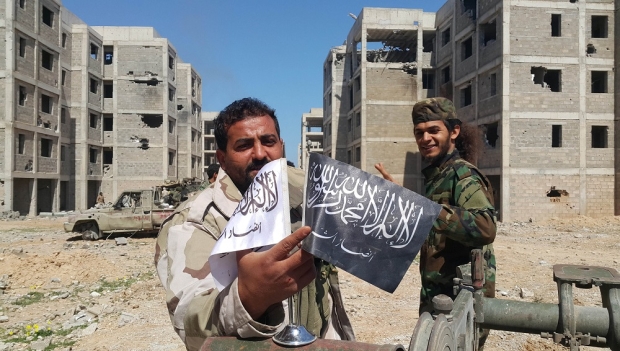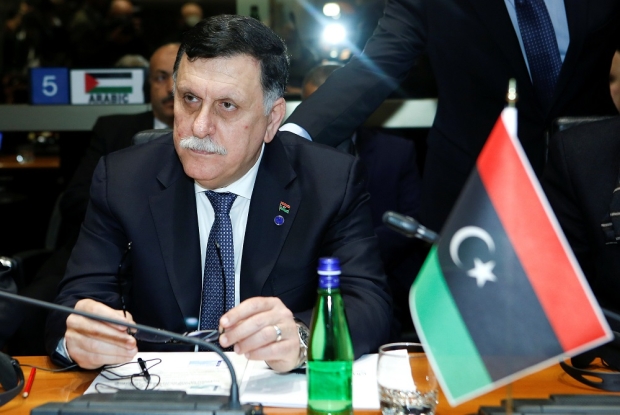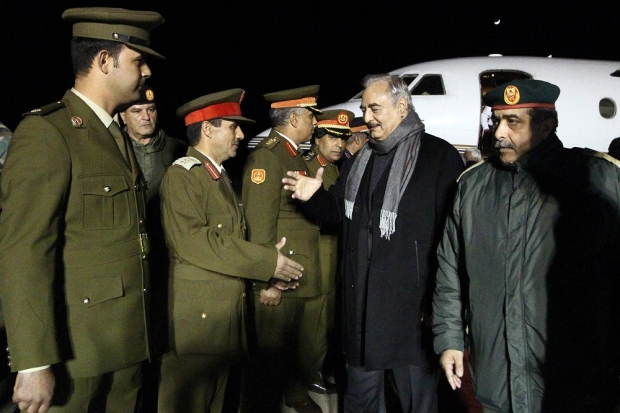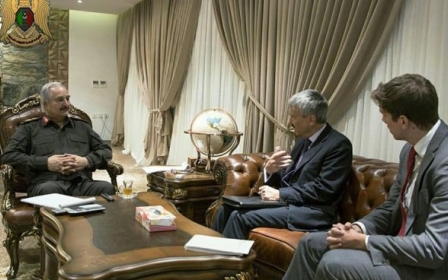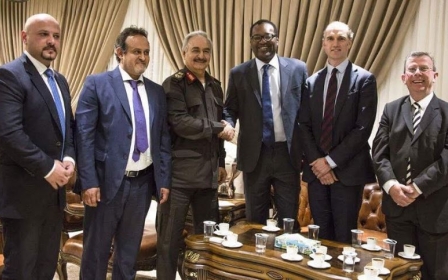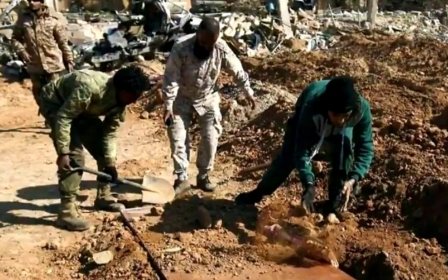Back Libya's Haftar and dump unity government, urges Tory think tank
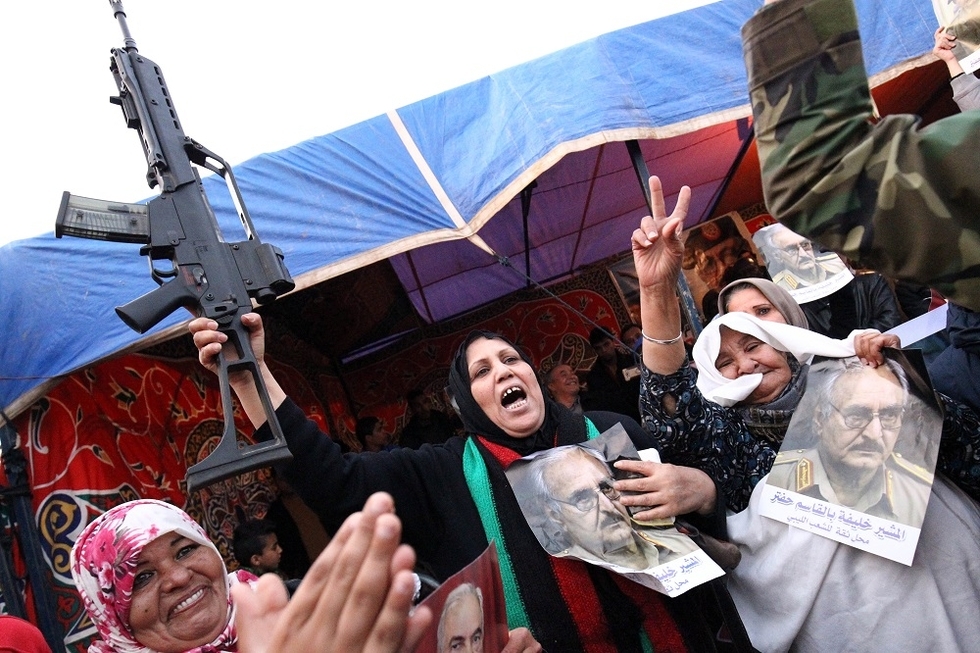
Britain should back General Khalifa Haftar to restore stability and defeat "jihadist terrorism" in Libya and reconsider its support for the UN-backed unity government in Tripoli, a right-wing think tank with links to Britain's Conservative party has said.
A report by the Conservative Middle East Council (CMEC), released weeks after a delegation visited Haftar in Libya, says the general has maintained a "large degree of order and governance" in eastern Libya and urges the UK to "engage" with Haftar to bring an end to people-trafficking from the country's ports.
In contrast, the report says the UK should reconsider its support for the unity government, also known as the Government of National Accord (GNA), which it says has been unable to exercise control over militias in western areas that are "plagued by disorder and insecurity" and dominated by "warlords and criminal gangs".
Haftar sees his mission as fighting jihadist terrorism. Although an observant Muslim, he appears to be largely secular in his world view
- CMEC report
However, the report, written by Kwasi Kwarteng MP and Leo Docherty, director of CMEC, has been dismissed by a prominent analyst as a "minority view" among Conservative politicians which should have little to no influence on British policy.
The CMEC, which is funded by a string of wealthy businesspeople with links to the Middle East, says the GNA's rival parliament, the Tobruk-based House of Representatives - which is associated with Haftar - is "a nucleus for the development of a Libyan parliamentary system, and has a geographical reach across Libya".
British policy on Libya supports the Benghazi-based Haftar in his fight against "jihadists", but backs the GNA in its national role and has called for Tobruk to reconcile its differences and for the general to integrate his forces into UN-backed structures.
The powerful Commons foreign affairs select committee in March said the GNA "is the only game in town. If it fails, the danger is that Libya will descend into a full-scale civil war to control territory and oil resources".
Haftar's forces, known as the "Libyan National Army" (LNA), have been fighting militias and GNA allies for control of the country's lucrative oil crescent, with ports such in Ras Lanuf changing hands several times over the last few months.
The report says Haftar has not stopped the flow of oil from Libya despite Tripoli refusing to honour an agreement to send 40 percent of revenue to Benghazi.
"Haftar and the LNA complain about a lack of money. The recent successful attacks by militias against LNA forces in the oil crescent show that the LNA is militarily vulnerable. It is by all accounts under-trained and under-equipped.
"Haftar sees his mission as fighting jihadist terrorism," says the report, adding that "although an observant Muslim, he appears to be largely secular in his world view".
"Haftar has a very clear focus on... defeating the jihadist militias in the west of Libya," the report says. "He struck the delegation very much as an operational soldier... who did not concern himself with grand political strategy.
"Despite the ongoing attacks in the oil crescent, Haftar appeared composed and confident. He sees himself as a Libyan nationalist and describes his mission as ridding Libya of the multitude of militias - both Islamist and criminal - that dominate the western half of the country.
Under his command, the report says, Haftar has all-but removed "jihadists" from Benghazi under "Operation Dignity", and "only a few remain on the western edge".
The report says the HoR parliament "is a flawed and somewhat disorganised body", but adds: "It does, however, offer a starting point for Libya’s democratic development if the country can achieve a measure of political stability in the near future."
In contrast, the report strongly criticises the GNA, which was set up in January 2016 with the backing of major western powers, leading to the schism with the HoR.
"In the west a large number of different militias – some criminal, some jihadist – prevail," says the report. "These include IS, Ansar al-Sharia... and the Benghazi Revolutionaries Shura Council.
"They do not have any organised political programmes, nor do they operate under party political labels. These militias reportedly derive significant income from the trafficking of migrants through Libya towards sea ports in western Libya.
"The point which cannot be stressed enough is that many are benefiting financially, and in terms of status and prestige, from the continuing political chaos in the west of Libya.
It is reported that the GNA and President Serraj have absolutely no control over... western Libya.
- CMEC report
"It is reported that the GNA and President [Fayez] Serraj have absolutely no control over any geographical area of western Libya.
"Their means of confronting the jihadist militant groups are negligible. The GNA has conspicuously failed to secure Libya’s borders with neighbouring countries."
Kwarteng and Docherty met Haftar in Benghazi in the first week of March. Last week, Britain's ambassador to Libya, Peter Millett, flew to the city to meet Haftar, for what the Foreign Office was a "positive meeting" that was "part of the UK's wider diplomatic outreach to promote stability in Libya through peaceful dialogue".
Haftar has also boosted his international profile with a visit to Russia, who he says is willing to support him with funding and weapons and, as the CMEC report noted, also has the support of Egypt, the UAE and France.
His operations in Benghazi have also been backed by an international coalition including the UK, Italy and France from a base of operations outside of the city.
But the call for the UK to throw its weight behind the general was firmly rebutted as a "minority view" by Mattia Toaldo, a senior policy fellow and Libya expert for the European Council of Foreign Relations.
"The British government's policy is in another place. It supports the GNA and says channels of communication should be kept open with all actors, including Haftar.
"There might be some within Whitehall who might be fascinated by this view, but they don't seem to have the upper hand.
"If there is a priority for British policy it is to avoid escalation, not take sides in a civil war. There is a serious danger of escalation, there has been either fighting or internal unrest in all major cities in the last few weeks.
He questioned what support exactly the CMEC was proposing.
"Do they mean the UK should break the arms embargo currently in place in Libya? This is always the first request Haftar makes.
If there is a priority for British policy it is to avoid escalation, not take sides in a civil war
- Mattia Toaldo, ECFR expert on Libya
"Haftar is not as strong as they think, and he is not as secular as they think: recently, the military governor for his part of Libya issued a travel ban against women, which he then changed to against young people. There is an increasing Salafist constituency that supports him."
Toalda said claims that Haftar was the best hope to end people smuggling was not correct. "He is hundreds of kilometres away from the major smuggling routes. Smuggling from eastern Libya has never been big to start with, for geographical reasons."
And the HoR was not the answer to the governing of Libya.
"The HoR has not met with a full quorum for some time. They have had only a handful of quorate meetings in the last year and a half. They are split and are now under the control of a small constituency of secessionist MPs.
"If that is the best example for Libya, we must have a discussion."
Britain's foreign office told MEE: "The UK will remain at the forefront of international efforts to help stabilise Libya, tackle the threat from Daesh and to secure its coast and tackle the migration crisis.
"Ensuring Libya’s stability and rebuilding the economy is the best way to prevent Libya becoming a base for Daesh and to tackle the criminal gangs who are making it a transit route for illegal migration."
Stay informed with MEE's newsletters
Sign up to get the latest alerts, insights and analysis, starting with Turkey Unpacked
Middle East Eye delivers independent and unrivalled coverage and analysis of the Middle East, North Africa and beyond. To learn more about republishing this content and the associated fees, please fill out this form. More about MEE can be found here.


